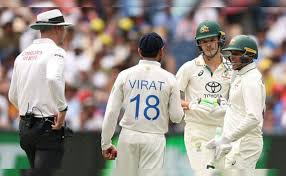India’s veteran cricketer Virat Kohli found himself in the spotlight during the fourth Test of the Border-Gavaskar Trophy series after a heated exchange with Australia’s debutant Sam Konstas. The altercation occurred at the end of the 10th over on Day 1 and involved a deliberate shoulder barge by Kohli. While the former Indian captain was fined 20% of his match fee and received one demerit point, many questioned why he was not suspended by the International Cricket Council (ICC).

The Incident: What Happened?
Australia’s 19-year-old Sam Konstas, who had impressed with a stunning knock of 60 on debut, was involved in the confrontation with Kohli. After facing the final ball of the 10th over, Konstas turned to walk towards the other end of the crease. Meanwhile, Kohli, carrying the ball, moved from outside the crease and bumped into Konstas. The contact sparked a verbal exchange between the two players before Usman Khawaja and umpire Michael Gough stepped in to diffuse the situation.
Understanding the ICC Code of Conduct
To analyze why Kohli avoided suspension, it is essential to review Article 2.12 of the ICC Code of Conduct. This article prohibits any form of inappropriate physical contact, such as deliberately, recklessly, or negligently colliding with another player or umpire. Violations under this article are categorized into four levels of severity, with the punishment determined based on specific factors:
- Context of the situation: Was the act deliberate, reckless, or avoidable?
- Force of the contact: How impactful was the physical contact?
- Resulting injury: Did the other party sustain any injury?
- Involved individual: Was the contact made with a player, umpire, or match official?
Assessment of the Incident
In Kohli’s case, replays confirmed that the shoulder barge was deliberate. However, the punishment was influenced by the lack of significant force in the contact and the absence of injury to Konstas. Since the incident involved a player and not an umpire or match referee, the offence was categorized as Level 1 or Level 2 rather than the more severe Level 3 or Level 4.
Historical Precedents
There is no precedent for a player receiving four demerit points solely for a shoulder barge. The most comparable instance occurred during the 2018 Test series between South Africa and Australia when Kagiso Rabada made contact with Steve Smith. Rabada was handed three demerit points for that incident. Historically, the only cases resulting in four demerit points have been for more severe infractions, such as ball tampering or showing dissent towards umpires.
Conclusion: Why Kohli Escaped Suspension
Although Kohli’s actions were deliberate, the minimal force and lack of injury played a significant role in the ICC’s decision. Additionally, the historical handling of similar incidents influenced the outcome. As a result, Kohli received a lighter punishment of a fine and one demerit point, allowing him to participate in the fifth Test match of the series.
The incident serves as a reminder of the ICC’s nuanced approach in assessing player conduct and reinforces the importance of adhering to the sport’s spirit.


